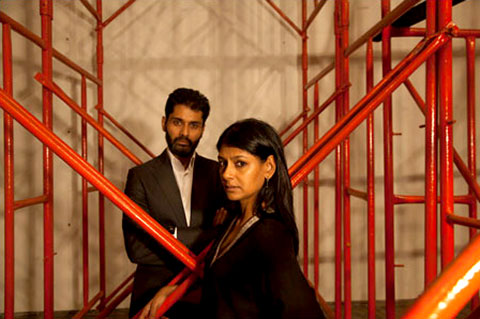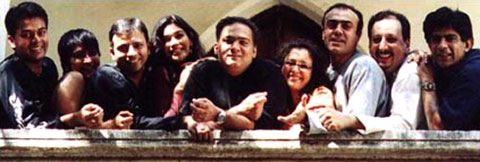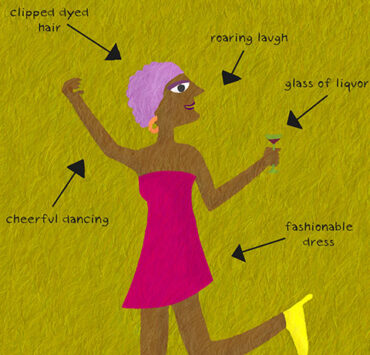A few weeks ago, at a production of Class of ’84 at St. Andrews Auditorium in Bandra, my wandering mind threw a mini-tantrum. “But what is that unforgettable line?” it screamed in typically Godot-esque fashion.
I ignored it as best as I could, but it was a sedimentary sentiment, the kind that leaves a stain. I must have pushed it to the back of my overflowing to-do cupboard without quite realising it then, and tried to focus instead on the play.
Sat at almost the same spot a couple of weeks later, at a performance of Between The Lines this time, I discovered a curious thing in my mental fabric: a stain. That same old stain, the one that waited anxiously for that unforgettable line. It was a reasonable refrain: I thought, just what will I retain from Between the Lines, Nandita Das’s directorial debut? (She also acted in and co-wrote the play.) There were a couple of clever lines, a poignant question or two and a lot of white noise. I wondered if I was being harsh because of the director’s pedigree, or if I judged her a little because she cast her husband in the role of the male lead.
No, I decided later, Subodh Maskara had made the best of a fairly average script, and Ms. Das was—expectedly—no slouch either. The play itself tackled a tricky topic, that of accidental gender inequality, of well-meaning sexism in heterosexual coupling, and not unconvincingly. What then, I wondered, did it lack? Why did it feel like I’d shown up to dinner only to find the menu consisted entirely of finger food? The answer, I realised, lay in the similarly bite-sized portions of unforgettable moments that had been served up by Class of ’84.
When Sarah Bernhardt said that theatre is the involuntary reflex of the crowd, she was probably counting on scripts that left room for reflection, on audiences that weren’t spoon-fed their reactions. Class of ’84 was no better than Between the Lines, and the reflexes of the crowd were no less passive, no more involved, than those for the latter. And that right there was the problem. I had always imagined the theatre to be a magical garden lush with intellectual stimulation, or a range of hills alive with cultural elitism, and what my—admittedly minimal—experience of the Bombay theatre circuit had delivered was an audience that laughed politely on cue. They trembled in collective indignation when a member of the crowd unwrapped an eclair or whispered furtively into their mobile phone, but their reaction to the play itself was more well-intentioned than participatory.
The fault, however, lay not with the audiences but with the plays themselves. Both plays shared thematic similarities: while Between the Lines tackled the gender divide in the context of a married, well-to-do, professional couple, Class of ’84 flirted briefly with another under-rug-swept social issue: homophobia. The couple in Between the Lines met and fell in love in college, while the eponymous Class of ’84 was, of course, an ensemble of St. Xavier’s alumni reuniting to mourn the death of a close friend. Both dealt with people and their attitudes changing over time, of knowing somebody so long that you fail to notice that you don’t know them at all anymore.
In theory, they’re interesting story arcs, full of of kitchen sink drama and Linklater-kitsch, stuff that should get you nodding along in agreement, or furious at the injustice of the nature of change. Both plays pull off the first part with varying degrees of conviction—Between the Lines with a hint of middle class restraint, Class of ’84 by ploughing every cliché in the high school reunion scrapbook. There were that’s-happened-to-me moments, and moments that didn’t but may as well have happened to you because you’ve seem them happen to so many of your favourite sitcom characters over the years. So far, so average. And I’m a great fan of average; average is no bad thing.
But the joys of television-bred familiarity aside, if you were looking for fury, sympathy, empathy–all perfectly reasonable expectations from a work of art—you were on the wrong damn channel. Much like any beloved sitcom gang, the characters in neither play seemed capable of any real shades of grey. Even as Das pulls her husband up for always helping himself to the bigger portion of food—and this elicited a few knowing chuckles from the men and the women in the audience—she wonders aloud why she subconsciously chooses the smaller portion for herself anyway, even in his absence. Oh well, maybe it’s just her diminutive metabolism that’s to blame then. Not a few minutes after being told that Cyrus, the token stoner in Class of ’84, is a lazy beach bum living off his father’s millions, we find out that he was, in fact, disowned by his wealthy parents and has been grappling with the pangs of unrequited love for one of the gang since, like, forever, man. You can’t possibly fault a Devdas, can you?
This balancing act goes on throughout, with every threat of night countered by sickeningly sweet sunshine. And in an odd coincidence, both plays use the same narrative device for these saccharine revelations: breaking the fourth wall. Every single cast member, in both plays, put their worlds on hold to personally tell the audience their side of the story. Every single one of them. Multiple times. It’s like assigning corners to quarrelling parents to hear them out individually, and giving up in the realisation that they probably deserve each other. You can’t—you just can’t—take sides when both parties take you into confidence and bare their souls to you. It takes the detachment out of voyeurism.
I’m not going to comment on the tradition of meta fiction, but I will say this: what was once an artistic and social movement is now just an inevitability. Think about it: when was the last time an intriguing fictional character was consigned to just the pages of a book or the silver screen? Movie characters now have Twitter handles you can follow, porn stars befriend you on Facebook and tag you in pictures of their first ever pina colada. Fifty Shades of Grey was originally written as Twilight fan fiction. Rock music videos peddle Coke, and the I.P.L. has long since replaced the W.W.E. as the preferred simulated sports fix. They’re everywhere, our erstwhile heroes, the Tyler Durdens and the Lance Armstrongs, telling us why they did what they did and with whom, and what everybody was wearing when they did. The Internet is just one great confessional in free fall. And it’s falling on our heads.
Few people I know can sit down to watch a movie without first checking out its ranking on IMDb, never mind reading up on character back stories and alternate endings afterwards. Do we really need to bring down more walls during a performance? What was once a path-breaking, relevant narrative device is now passé. While Bernhardt’s evocation of theatre as the audience’s reflex frankly seems a little more appropriate for a music concert or a stand-up comedy set, the benefits of a theatre audience that is left to make up its mind about the characters and the story must surely be obvious. The problem with bringing down the fourth wall so often is that the audience gets hardly any time to fence-sit, to contemplate, to react. And when you’re not sitting on the fence, you’re stretched out on the couch in your living room, where all the world’s a stage and your only responsibility as a viewer is to play catch-up with the laugh track.










